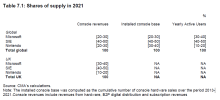haha of course, it's a lot of posturing happening for sure. On one hand, the markets are gerrymandered to create a high performance console segment to remove Nintendo so that COD argument doesn't apply to them. And then in doing so, we get into a weird situation where metrics can be exploited to show a 80% market share for Sony. It's all terrible really.According to the narrative from the company that doesn't provide any figures for comparison.And again, the CMA operates only in the UK where PS is nothing like 80% of the console market even factoring in last gen. Nor even most recent sales ratios with PS5 breaking out of a constrained supply. Nor comparing revenues which is 16B:24B, or 2:3. And that's taking the console space in some bizarre isolation from the whole 'home gaming sector' (to exclude mobile) that incudes the MS dominated PC OS and Nintendo handhelds. Compare Sony's revenue and sales as part of the whole of home gaming, it's not 80%. Sony is 40% of the Sony:MS:Nintendo console triumvirate, which is 27% of the whole gaming sector. So Sony is 40% of 27%, about 11% of the entire gaming sector, versus 19% for PC downloads. Figures from here:
View attachment 8432
So, yeah, it turns out that '80% market share' bullet point argument really gets my goat.
It makes for an interesting discussion because CMA is really holding the keys here for the global market, even though they only really need to concern themselves with just the UK.
For me, it's clear Sony just doesn't give a shit about CoD. They just don't want the merger to go through. If I liken this back to the controversy of F1 between RB and Mercedes. For RB any penalty will be considered too harsh, and for RB's competitors, no penality towards RB will satisfy them. In the end a decision will be made, and all parties will just need to respect it.
We are seeing a similar situation play out here. Sony is not willing to lose any % pts of revenue to MS, regardless of how it is formed, and MS wants to prove that it's incapable of winning even with this change. Both Sony and MS will be working with regulators to get what they want out of this.
I have no doubts Sony will survive this, especially with the 10+ year COD binding agreements. But Sony's CEO's job is to ensure maximum return on profits and long term strategy, and things like this fall directly into his role as CEO for SIE. So this is where he will take it to the extreme to show his shareholders value.
I don't know if this will come back and burn them later however. But it's to watch and enjoy.

